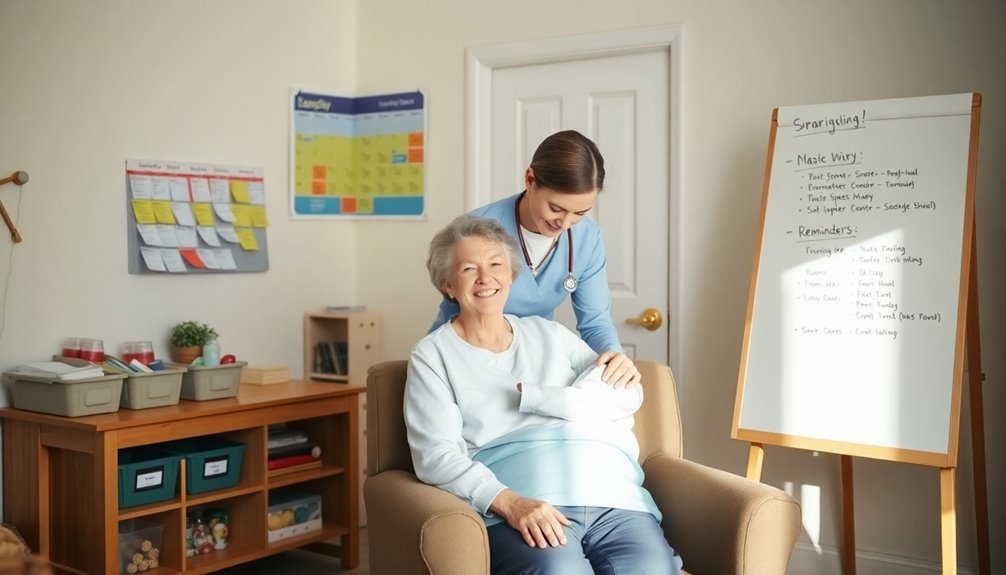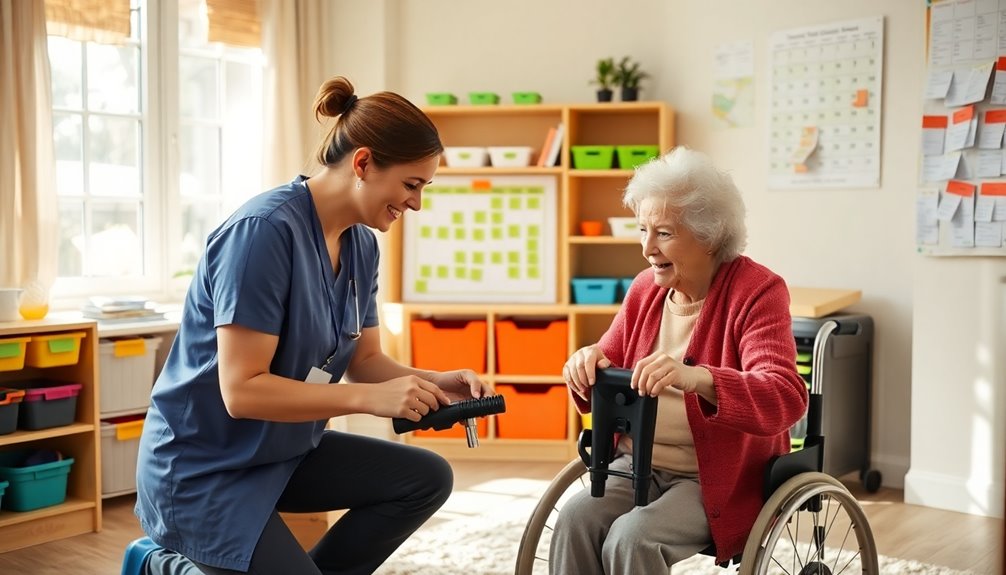To simplify life for everyone involved in caregiving, start by establishing a routine for predictability. Communicate effectively to clarify needs and prioritize your own self-care for well-being. Organize tasks for efficiency, seek support from peers and groups, and foster independence in your care recipient. Remember to emphasize patience and understanding, practice flexibility to adapt to changing needs, and celebrate small victories together. There's plenty more to explore on enhancing your caregiving experience.
Key Takeaways
- Establish a consistent daily routine to enhance predictability and reduce anxiety for both caregivers and care recipients.
- Utilize technology and apps for task management, reminders, and scheduling to streamline caregiving tasks efficiently.
- Foster open communication and active listening to address care needs and build trust between caregivers and recipients.
- Encourage independence by involving care recipients in personal care activities and celebrating their small victories.
- Prioritize self-care and flexibility to manage stress and adapt to changing caregiving needs effectively.
Establish a Routine for Predictability

Establishing a routine is vital, especially when you want to create a sense of predictability in caregiving. By doing so, you can effectively manage your caregiving responsibilities while reducing anxiety for both you and your care recipient.
A consistent daily schedule streamlines tasks like meals, medication times, and leisure activities, helping you prioritize what truly matters. This predictability not only enhances efficiency but also promotes better health outcomes. When your care recipient knows what to expect, it fosters a sense of independence and dignity, allowing them to engage actively in their care. Additionally, incorporating pet therapy can further enhance emotional well-being, providing companionship that reduces feelings of isolation. Research shows that increased smartphone usage among seniors can also help them stay connected with loved ones, contributing to a more balanced and fulfilling life for everyone involved. Establishing a routine supports overall health by ensuring that essential needs are consistently met, which contributes to a more balanced and fulfilling life for everyone involved.
Communicate Effectively to Clarify Needs

A well-structured routine lays the groundwork for effective communication, making it easier to clarify the needs of your care recipient. Actively listen to their concerns and preferences, ensuring you honor them.
Use clear and simple language when discussing care plans or daily routines to avoid confusion. Regularly check in with them to reassess their needs and adjust your caregiving duties based on their feedback. Emotional detachment can occur over time, so it's vital to maintain connection through consistent communication. Advance directives can also serve as a helpful tool to understand and respect their healthcare preferences.
Pay attention to non-verbal cues like facial expressions and body language, as they can reveal important insights into their emotional state. Encourage open dialogue about feelings and experiences to foster trust and strengthen your relationship.
This approach not only enhances communication but also makes addressing challenges more manageable. Additionally, incorporating mindfulness practices can significantly improve your ability to stay present and attentive during conversations.
Prioritize Self-Care for Personal Well-Being

Prioritizing self-care isn't just a luxury; it's a necessity for your health and effectiveness in caregiving. Engaging in daily personal activities and ensuring you get enough sleep can greatly boost your emotional well-being and stamina. Additionally, participating in community events can provide valuable support and connection with others, enhancing your overall caregiving experience. Regularly checking your gear and equipment can also help ensure that you are prepared for any challenges that may arise in your caregiving duties. Moreover, understanding the importance of wellness in daily life can guide you in making choices that benefit both you and those you care for.
Daily Personal Activities
- Prioritize Enjoyable Activities: Whether it's reading, walking, or crafting, find time every day to do something that brings you joy.
- Connect with Loved Ones: Stay in touch with family and friends to maintain emotional support and prevent isolation.
- Incorporate Humor: Laughing can lighten your mood and serve as a great coping mechanism during tough times. Additionally, regular exercise can also help improve your mental health and reduce stress levels, making it vital for caregivers.
Healthy Sleep Habits
Finding time for daily personal activities is just one way to support your well-being as a caregiver.
Prioritizing good sleep habits is equally crucial. Aim for 7 to 9 hours of quality sleep each night to boost your physical health, emotional stability, and caregiving effectiveness. Establish a consistent sleep schedule and create a restful environment by reducing screen time before bed; this helps your body produce melatonin for better sleep quality. Incorporating mindfulness practices can help block internal chatter and promote a sense of tranquility, further enhancing your sleep experience. It is also important to recognize that emotional neglect, often stemming from narcissistic tendencies, can affect your well-being, making self-care essential.
Incorporating a relaxing bedtime routine, like reading or meditating, signals your mind to wind down. Don't forget to engage in regular physical activity during the day, which can also enhance your sleep. Additionally, quality sleep enhances creativity and problem-solving skills, further benefiting your caregiving role.
Organize Caregiving Tasks for Efficiency

To guarantee you manage caregiving tasks efficiently, creating a structured schedule can be a game changer. Start by outlining daily or weekly tasks and appointments to ascertain nothing gets overlooked. This helps you effectively care for your loved ones without feeling overwhelmed.
Consider these strategies:
- Utilize a task management app: Track progress on responsibilities, allowing easy adjustments and prioritization.
- Delegate tasks: Involve family members or professional help to share the caregiving load and reduce stress.
- Centralize important documents: Keep medical records and care plans in one place for streamlined access and communication with healthcare providers.
Incorporating emotional support into your caregiving approach can significantly enhance the overall well-being of both caregivers and recipients. Regularly review and adjust your strategies based on feedback and changing needs to maintain efficiency in your caregiving journey.
Seek Support From Peers and Groups

Connecting with peers and support groups can considerably enhance your caregiving experience, as it offers a space to share your challenges and triumphs.
Engaging in a support group, whether in-person or online, helps you realize you're not alone in this journey. Listening to others' stories can provide valuable coping strategies and emotional relief, reducing feelings of isolation. This type of engagement can also promote active listening and empathy, which are crucial skills for nurturing relationships.
Local Area Agencies on Aging (AAAs) often facilitate these groups, giving you access to resources that lighten your load. Online communities make it easier to stay connected with caregivers facing similar challenges, no matter where you are. Additionally, support groups can serve as a valuable resource for those recovering from narcissistic abuse, promoting healing and understanding among survivors.
Utilize Technology for Reminders and Scheduling

In today's busy world, using technology can make managing caregiving tasks much easier for you.
You can set up reminders with apps, share calendars with family, and even use specialized caregiving tools to keep everything organized.
Embracing these digital resources helps guarantee you stay on top of important schedules and responsibilities.
Set Up Reminders
How can technology simplify your caregiving responsibilities? By setting up reminders, you can streamline daily tasks and guarantee that nothing slips through the cracks.
Here are three effective strategies:
- Smartphone Apps: Utilize apps like Google Calendar or Todoist to schedule medications, appointments, and reminders for both you and your care recipient.
- Voice-Activated Devices: Employ devices such as Amazon Echo or Google Home to create hands-free reminders, making organization easier for everyone involved.
- Wearable Devices: Leverage smartwatches to send discreet alerts for critical tasks, keeping both you and your care recipient on track.
These approaches not only enhance your efficiency but also support professional caregivers in providing exceptional care.
Use Caregiving Apps
Caregiving apps can be game-changers for managing your daily responsibilities. These tools help you keep track of medication schedules, appointment times, and essential caregiving tasks, ensuring nothing slips through the cracks during your caregiving journey.
With user-friendly interfaces, these apps make it easy to navigate complex duties, greatly reducing stress. Many caregiving apps also offer features for tracking health information, like blood pressure, which you can share with healthcare providers for informed decisions.
Plus, some apps facilitate better communication by allowing multiple family members to access and update shared calendars. By utilizing technology, you can connect with resources and support networks, making your caregiving experience smoother and more manageable.
Share Calendars Efficiently
Ever wondered how you can streamline your caregiving responsibilities? Utilizing shared calendars can greatly enhance coordination among family caregivers.
Here are three strategies to make the most of this technology:
- Set Automatic Reminders: Schedule alerts for medical appointments and medication refills to minimize missed events.
- Color-Code Events: Use different colors to categorize appointments (e.g., medical, social, personal) for quick reference.
- Access on All Devices: Encourage family caregivers to view and update the shared calendar on their smartphones, tablets, or computers for real-time information.
Regularly review the shared calendar during family meetings to keep everyone informed about upcoming responsibilities and changes.
This approach not only simplifies scheduling but also fosters teamwork among caregivers.
Foster Independence in the Care Recipient

Fostering independence in your care recipient is essential for their self-esteem and overall well-being. Encourage them to participate in personal care activities like dressing, grooming, and meal preparation. This involvement promotes autonomy and boosts their confidence.
Provide adaptive tools, such as grab bars and reachers, to help them maintain safety while being independent at home. Establish a structured routine that allows them to make choices about their daily activities, enhancing their sense of control.
Offer options in clothing, meals, and activities, which empowers them to express their preferences. Regularly assess their abilities and adjust the level of assistance you provide, allowing them to take on more responsibilities as they feel capable, ultimately fostering independence and confidence.
Emphasize Patience and Understanding

In caregiving, practicing active listening can make a huge difference in how you connect with the person you're caring for.
By managing your expectations realistically, you'll create a more compassionate environment that fosters trust and patience.
This approach not only benefits your care recipient but also helps you feel more grounded and less stressed.
Practice Active Listening
Active listening is an essential skill that can greatly enhance your caregiving relationships.
As a care professional, when you practice this skill, you foster deeper connections and respect, leading to an improved mood for both you and the person you're caring for.
Here are three key strategies to incorporate active listening:
- Minimize Distractions: Turn off electronics and focus entirely on the conversation.
- Demonstrate Patience: Allow the person to express themselves fully, showing that you value their thoughts and feelings.
- Respond Thoughtfully: Reflect on what they've said to show understanding and encourage further dialogue.
Manage Expectations Realistically
Managing expectations realistically is essential for both caregivers and those they care for, especially when facing the complexities of chronic illnesses or cognitive decline. When you acknowledge that progress may be slow, particularly in dementia care, you create a more compassionate atmosphere.
This understanding reduces stress for everyone involved, fostering harmony in your caregiving environment. Practicing patience allows you to navigate unexpected challenges with greater ease, improving your mental well-being and the quality of care you provide.
Open communication about limitations and needs helps build trust and encourages both you and the care recipient to express feelings and concerns. By emphasizing understanding and empathy, you strengthen your bond, leading to more effective care and emotional support for everyone.
Practice Flexibility in Caregiving

How can flexibility transform your caregiving experience? Embracing flexibility allows you to adapt your routines based on your loved ones' changing needs, creating a more personalized care journey.
When you prioritize adaptability, you not only reduce stress for yourself but also for those you care for. Here are three key benefits of practicing flexibility:
- Enhanced Communication: Open dialogue fosters trust and collaboration, making it easier to understand each other's needs.
- Better Stress Management: Being open to change enables you to handle unexpected situations without feeling overwhelmed.
- Reduced Burnout: A flexible mindset helps you maintain your well-being, allowing you to provide high-quality care.
Celebrate Small Victories Together

While daily caregiving tasks can sometimes feel overwhelming, taking a moment to celebrate small victories can transform your experience. Recognizing achievements, whether it's completing a daily task or reaching a personal goal, boosts morale for both you and the person you care for.
Simple practices like sharing a daily highlight or creating a "win list" can enhance communication and strengthen your bond. When you celebrate small victories together, you're reinforcing a sense of accomplishment that's essential for maintaining motivation and emotional well-being.
Frequently Asked Questions
What Are the 5 Principles of Caregiving?
The five principles of caregiving are fundamental for effective support.
First, you need compassion, which means understanding the feelings and needs of those you care for.
Communication is critical; actively listen and engage in clear dialogue.
Collaboration with healthcare professionals and family guarantees a unified approach.
Consistency in routines helps create stability for the care recipient.
Finally, don't forget self-care; it's essential for your well-being, allowing you to provide the best care possible.
What Are the Four Pillars in Caregiving?
The four pillars in caregiving are essential for providing effective support.
First, focus on physical health maintenance by exercising regularly and eating a balanced diet.
Next, prioritize emotional well-being by recognizing your feelings and fostering open communication.
Third, engage socially by connecting with your community and seeking help when needed.
Finally, practice stress management techniques, like relaxation methods and taking breaks, to maintain your mental balance and enhance your caregiving experience.
What Are the Coping Skills Strategies for Caregivers?
To cope effectively as a caregiver, you can start by identifying your stressors and addressing them directly.
Practicing self-compassion is vital; remember, it's okay to have limitations.
Engage in relaxation techniques like meditation or exercise to relieve stress.
Joining support groups can provide valuable insights and camaraderie.
Finally, prioritize personal time for hobbies or social activities to prevent burnout and maintain a healthy balance in your caregiving journey.
What Do Caregivers Need the Most?
What's the one thing caregivers crave most? It's support.
You need emotional understanding and a sense of community, as feeling isolated can weigh heavy on your shoulders. Connecting with others in similar situations can lighten the load.
Additionally, reliable resources and regular breaks are essential for your well-being. Financial assistance can ease financial burdens, allowing you to focus more on care and less on the stress that comes with it.
Conclusion
By weaving these caregiving strategies into your daily life, you create a tapestry of support that brightens the journey for everyone involved. Just like a well-tended garden, nurturing your own well-being and fostering independence in your care recipient allows growth and flourishing. Remember, each small victory is a blooming flower, deserving of celebration. With patience and flexibility as your guiding stars, you'll navigate the caregiving path with grace, making life simpler and richer for both you and those you care for.









